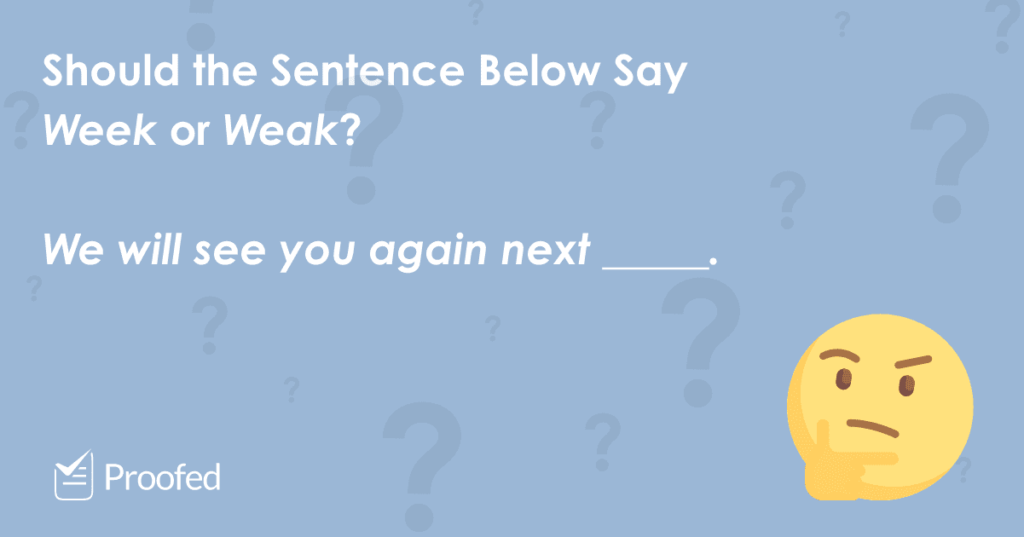The words “week” and “weak” sound identical but have different meanings. And since they only differ by one letter, it is easy to mix these terms up. To avoid errors when using these terms, then, read our guide below.
Week (Seven Days)
The noun “week” refers to a period of seven days. Usually, this applies to a calendar week (i.e., Monday to Sunday):
The team practices three times a week.
Monday is the first day of the week.
But we can also use “week” to describe any period of seven days in a row:
My assignment is due a week from today.
Additionally, we often divide the week up into a working week or “work week” (i.e., the days we work each week) and a weekend (i.e., the time we take off at the end of the week). And when contrasted with the weekend, we sometimes use “week” alone to refer to the working week:
I go shopping on weekends because I’m too busy during the week.
Find this useful?
Subscribe to our newsletter and get writing tips from our editors straight to your inbox.
Traditionally, the work week is from Monday to Friday. But people’s working patterns are changing, so the terms “working week” and “work week” can refer to different periods (e.g., if someone works Tuesday to Saturday instead, or when we’re referring to the idea of a four-day working week).
In most cases, though, the word “week” still refers to a period of seven days.
Weak (Not Strong)
The adjective “weak” means “not strong” or “not good.” This can apply to many things, including the following:
- Physical strength or durability (e.g., He was too weak to lift the boulder)
- Mental strength or endurance (e.g., She’d always been weak-willed)
- Intensity or brightness (e.g., It was hard to see in the weak light)
- Argumentative strength (e.g., Your argument for the defendant is weak)
- Power or influence (e.g., His weak leadership is a problem)
- Skill, ability, or quality (e.g., His spelling is weak)
- Drinks or liquid solutions (e.g., Do you prefer weak tea?)
In all cases, though, “weak” means “not strong” or “not good.” And anything that can be strong (e.g., a strong electromagnetic field or strong signal) can also be “weak” (e.g., a weak electromagnetic field or weak signal).
Summary: Week or Weak?
When you are trying to work out which spelling to use, remember:
- Week is a noun and typically refers to a period of seven days
- Weak is an adjective that means “not strong” or “not good enough.”
If you struggle to tell these words apart, keep in mind that “week” always refers to days. For anything else, you can use the word “weak” with confidence. And if you would like a little extra help ensuring your writing is error free, why not upload a document for proofreading today?
